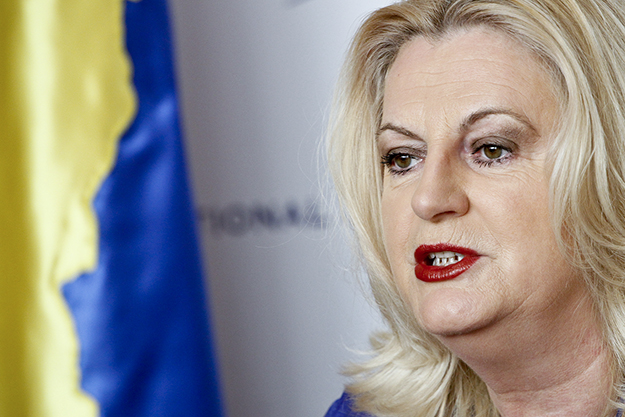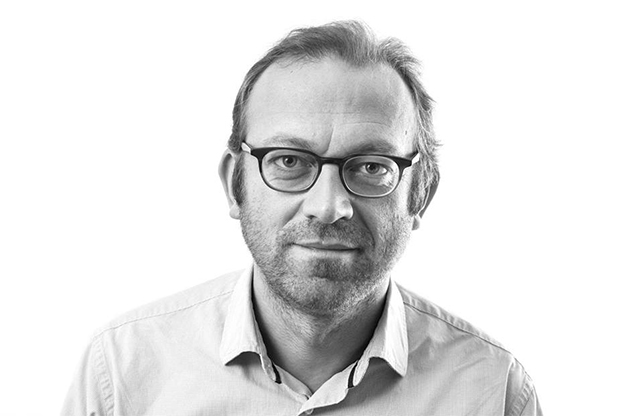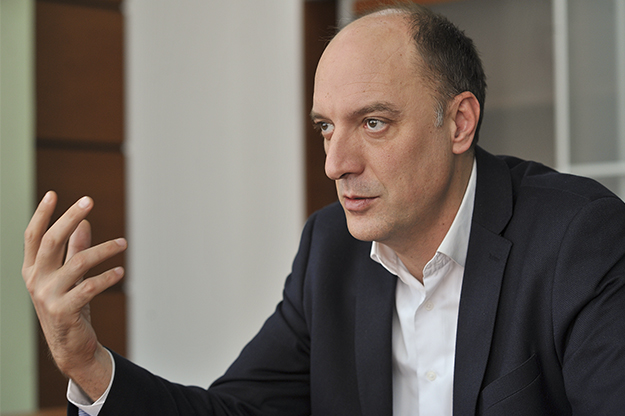“For some years I have been complaining that this dialogue has turned into abuse. This is more of a dialogue for justifying the political classes in both countries, and to some extent in serving internal political goals.”
This was the opinion of current prime minister Ramush Haradinaj when he spoke to Deutsche Welle a year ago, while being detained in France under an Interpol arrest warrant issued by Serbia.
Haradinaj, who was then in opposition, argued that the dialogue between Kosovo and Serbia served to guard corrupt regimes. “The danger in the Balkans comes from corrupt and criminalized political elites, who cooperate to maintain power,” he stated. “The dialogue should be removed from these agendas. If the dialogue serves to preserve power, then this is very dangerous.”
Several months after he was released, Haradinaj became Kosovo’s prime minister. In his new role as the head of the government, Haradinaj has an opportunity to influence the dialogue, to help clean up the process he saw as so damaging and corrupted a year ago.
So far, Haradinaj has not outlined his vision as to how he will do this, other than to repeat the often cited mantra of Kosovar politicians in power that “the dialogue has no alternative.” He has however, appointed his former chief of staff, Avni Arifaj, as the new chief negotiator.
Breaking the deadlock
Discussions are currently halted after the shooting of Oliver Ivanović interrupted the first meeting between the two parties in nearly a year. The Serbian delegation has indicated they are unlikely to resume until questions regarding the case are answered. When they return to the table, the two parties will once again seek to “normalize” relations, which they have been attempting to do since March 2011.
Progress in this aim is often seen skeptically in Kosovo. Tensions with Serbia have frequently arisen since the beginning of the dialogue, with critics citing the campaign against Kosovo’s UNESCO membership, the infamous “train incident” and Haradinaj’s arrest as evidence the dialogue has failed to create a ‘normalized relationship.’
As Agron Bajrami, editor-in-chief at Kosovar daily newspaper Koha Ditore tells K2.0: “The dialogue that we are participating in is producing nothing more than tensions and no normalization. Who sent the train last year? Who hampered Kosovo’s membership to UNESCO? The same people that were sitting down for seven years to talk about normalization! We cannot act like everything is fine when nothing seems normal.”

Edita Tahiri was Kosovo’s chief negotiator for over six years. She describes Serbia as still living in “hegemonist dreams.” Photo: Atdhe Mulla / K2.0.
In some regards, the two sides seem further apart than when they started. Speaking to K2.0 in December 2017, Arifaj’s predecessor as chief negotiator, Edita Tahiri, who led negotiations from 2011-2017 described her counterparts as unwilling and domineering.
“Serbia does not have a willingness for peace or neighborly relations and still lives in hegemonist dreams,” she said. “If the international decision did not exist due to the resolution of the General Assembly of the UN in September 2010, Serbia would not accept talking to Kosovo, as it still has an inferiority complex over being the loser in the Kosovo war.”
Talking for Europe?
But it’s important to remember why the two parties began discussions in the first place. As Tahiri told K2.0 “after each war, peace comes and this dialogue is as such. It has the final aim to install peace and reciprocal recognition between the two states.”
The latter notion of mutual recognition is clearly not a vision shared by Serbia’s president Aleksandar Vučić, who told reporters at the Davos summit last week that “if the dialogue means recognizing Kosovo — then thanks and goodbye.”
However, there are areas where their discourse is more in harmony. “Both Kosovo and Serbia should think for the future, so that new generations will not inherit a conflict between our countries,” Tahiri told K2.0. “European integration also requires from every country aspiring to join the EU to have good neighbourly relations, and not to have an open issue with neighbours.”
Her statement has echoes of Vučić’s editorial in Blic last summer, in which he also insisted issues related to Kosovo “must not be left to our children.”
Then there is the subject of European integration. Successive governments in both Kosovo and Serbia have restated their long-term commitment to future membership of the European Union but accession seems impossible with relations existing as they do currently.
The EU’s new enlargement strategy entitled “A Credible Enlargement Perspective for the Western Balkans” is unveiled on Feb. 6. In a paper published in January, the Balkans Policy Research Group think-tank based in Prishtina revealed part of the draft strategy: “A comprehensive normalization of relations in the form of a legally binding agreement is urgently needed and is crucial for the European perspective of both Kosovo and Serbia, and the region as a whole.”
It is in this regard that Tahiri believes the dialogue has been most in Kosovo’s interest, as it paved the way toward European integration and the legitimacy of the sovereignty of Kosovo. “The Brussels dialogue has directly contributed to the Stabilisation and Association Agreement (SAA) signed with the EU, and Kosovo has opened the chapter of contractual relations with the EU and has officially entered in the process of European integration,” said Tahiri.
Tahiri refers to the dialogue as an “international obligation” and points to the fact that the five EU members not to recognize Kosovo’s independence supported the SAA, in part due to Kosovo’s commitment to the dialogue. “Our commitment to the dialogue improved our image as a state that is committed to peace and stability in the region […],” she stated.

Journalist Enver Robelli believes that efforts were made in Kosovo to use the dialogue to repair tarnished reputations, but for individuals rather than the state. Photo: Boris Muller.
Enver Robelli, a foreign affairs editor at Swiss daily newspaper, Tages-Anzeiger, concurs with Tahiri’s view that the dialogue has done some good public relations work, though feels it was for individuals rather than the state. He feels that the Kosovar state entered into discussions accepting conditions that left them disadvantaged during negotiations.
“The reason for this irresponsible behavior of the Kosovar side is that discredited Kosovo leaders want to look ‘moderate’ in front of the international community, and guarantors of peace and agreements with Serbia,” Robelli told K2.0. “In exchange for their ‘moderate’ behaviour these leaders expect support from the international community, amnesty or privileged treatment,” Robelli says. Agron Bajrami meanwhile rejects Tahiri’s notion that the dialogue has pushed forward Kosovo’s European integration. He states that the dialogue was always presented to the Kosovar public as a means of Serbia recognizing Kosovo and entering the European Union. “While Serbia has gained candidate status to enter the EU, Kosovo was neither recognized by Serbia, or the five non-recognizers, nor is it in the process of EU integration,” he told K2.0.
Serbia started negotiations for accession to the Union in January 2014 and has opened 10 chapters with 25 others remaining. On the other hand, Kosovo remains only as potential candidate and has not officially begun the accession process. On Jan. 30, EU Observer reported that in light of the approval of the aforementioned enlargement strategy, the Spanish state had sent an informal paper to the European Commission stating that “Kosovo is not part of the enlargement process.”
If the dialogue is viewed as a political tool, then Bajrami believes it one that has been used far more effectively by Serbia than Kosovo. “What has happened is that Serbia advanced toward the EU from the process of the dialogue, while Kosovo’s path even today is unclear — as neither the 5 EU ‘non-recognizers’ have recognized Kosovo, nor has Serbia come any closer to recognizing Kosovo,” he says.

Member of Parliamentary Committee on Foreign Affairs, Diaspora and Strategic Investments and Vetevendosje Deputy Visar Ymeri feels that instead of using the dialogue, the Kosovar state has been used by it. Photo: Atdhe Mulla / K2.0.
It is a view shared by former leader of opposition party Vetevendosje and current member of the Kosovo Assembly, Visar Ymeri. “Since 2011, the Republic of Kosovo has not been a normal sovereign state that uses the dialogue to advance its interests and its rights, and improve relations with other countries,” Ymeri told K2.0 in December 2017. “Instead, it is a state that is being used by the dialogue.”
Former chief of negotiations Tahiri also sees domestic benefits as a result of the dialogue, specifically the consolidation of Kosovo. “Because of the Brussels Dialogue, the sovereignty of Kosovo was consolidated in many regards in the north of Kosovo,” she stated. “Today, we have the police, judicial system and customs in the north of the country, while we have dissolved the Serb parallel structures.”
Bajrami counters that, in this regard, the essence of the dialogue is flawed. He argues that issues discussed have pertained more to internal regulation of Kosovo than that of a typical inter-state dialogue. “To integrate the North, to dissolve the parallel structures… These are internal issues of Kosovo,” he said.
Agreements on these issues have also caused disagreements over implementation. Both Kosovo and Serbia have continually accused each other of deliberate delays and failure to implement agreements, including the Association of Serb Majority Municipalities and the dissolution of parallel structures in the north of Kosovo.
A September 2017 review of the implementation of the Kosovo-Serbia Dialogue by Columbia University’s Institute for the Study of Human Rights highlighted obstructions caused by both countries in implementing the agreements reached in Brussels.
For Bajrami, the hosts of the dialogue, the EU, should have learnt not to count on the agreements of leaders, as the implementation on the ground requires more domestic unity in both countries, especially Kosovo.
“[Hashim] Thaçi signed the agreement in 2013 to create the Association of Serb Majority Municipalities, but we have seen what happened — he did not have the power to implement it,” Bajrami told K2.0. “The EU should have learnt, particularly in the last 2 or 3 years, that neither Thaçi nor Vučić have the power to impose agreements, especially Thaçi.”
Despite both Thaçi and Vučić moving into presidential positions in recent years, there is much discussion about their continued involvement in the dialogue, with both men stating their willingness to appear in the next phase of the dialogue.
Missing ingredients
This next phase has been labelled “normalization and reconciliation,” the latter of which both Bajrami and Robelli believe has clearly been missing from the dialogue so far. In addition to the ulterior motives he outlined for the Kosovo delegation, Robelli believes there is also an absence of political will behind reconciliation on the Serbian side.
“Reconciliation is a process and not a spontaneous act, but for it you need political will, a readiness to respect each other and learning from the past,” he told K2.0. “Has Serbia achieved this? Not at all. Indeed, there is a tendency to rehabilitate the key actors of the Milosevic regime.”

Editor-in-chief of Koha Ditore, Agron Bajrami states that there has been an absence of reconciliation in the dialogue, in part due to a lack of perceived justice regarding events of the past. Photo: Atdhe Mulla / K2.0.
Bajrami points to the absence of justice creating a difficult space for reconciliation to occur within. “Reconciliation and peace cannot happen without justice,” he states. “One reconciles when there is a satisfaction that justice was brought about for the crimes of the past. How can reconciliation happen when there is even a lack of an apology for what has happened in the past?”
Ymeri echoes this stance and adds that Vetevendosje have always spoken about the need for preconditions in order to then have a dialogue with Serbia. “An apology for the war crimes committed in Kosovo is the the first step, but we also need to speak about war crimes reparations and all the victims for which Serbia has never shown any willingness to talk about,” says Ymeri.
Moving on
Regardless of their criticisms, Ymeri, Bajrami and Robelli all believe it is essential for peace to have a dialogue with Serbia. “I don’t think that the dialogue has any alternative, and we need to talk because otherwise there is war,” Ymeri stated. However, I think that by saying that the dialogue has no alternative, by no means should it mean that there are no alternative dialogues.”
For Ymeri, this alternative dialogue is one that is not crucial to Kosovo’s continued existence. “I do not think that we are doing any sort of favor to the dialogue, or the region, or at least to Kosovo if we take the dialogue with Serbia as a necessary condition for the existence of Kosovo’s statehood,” he says. “We need a dialogue but not as such that will be a condition of our existence.”
He adds that there needs to be clarification on what is being discussed. “If you and I cannot agree what is good then it is futile to debate about the ‘good life’ because we are talking about two different things and I think this has been the biggest problems in the talks between Kosovo and Serbia.”
For Robelli, the dialogue can only progress through reconciliation, which in turn is only achievable through the two states emancipating themselves from their existing political classes. “Currently, in both states populist leaders are ruling — whose main interest is to enrich their political clans,” he told K2.0.
When the next phase of the dialogue will begin is uncertain, but its success seems both more important and more difficult than ever, with reconciliation also being added to the task of normalizing relations. Whether the two countries representatives will be able to achieve this, only time will tell.K
Feature image: Majlinda Hoxha / K2.0.

